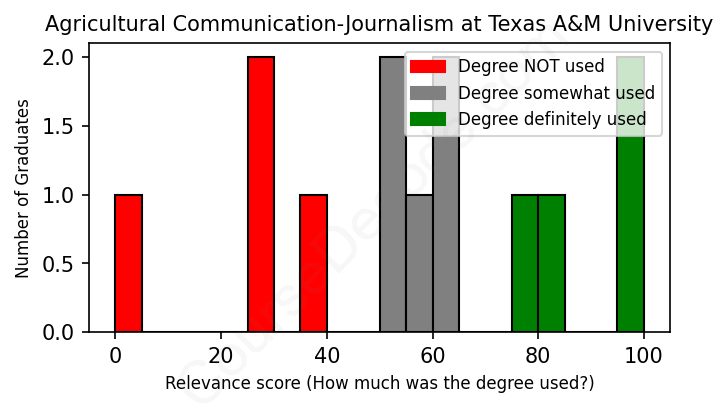
First, some facts. Of the Agricultural Communication-Journalism graduates from Texas A&M University we've analyzed , here's how many have used (or NOT used) their degree in their career:

These are estimates based on AI analysis of 13 LinkedIn profiles (see below).
The verdict? Significantly below average. Overall, with an average relevance score of 55%, Agricultural Communication-Journalism graduates from Texas A&M University have a much lower likelihood (-12%) of finding work in this field compared to the average graduate across all fields:
And for comparison, here's the chart for all profiles we've looked at across all degrees.
Also, after graduating, only 15% of these graduates have pursued further education other than another Bachelor's degree (such as a Masters degree or other), compared to the average across all profiles of 35%. This suggests a Bachelors degree is enough for most Agricultural Communication-Journalism graduates, and it's normal to look for work straight after graduation.
See the details:
|
Relevance score: 96% We think this person has gone into a career highly relevant to their degree. We think this person has gone into a career highly relevant to their degree.
DEGREE INFOGraduated in 2018 from Texas A&M University with a Bachelor of Science - BS in Agricultural Communication-Journalism. No other secondary education since. JOB HISTORY SINCE GRADUATIONSocial Media Marketing Intern Houston Livestock Show and Rodeo Mar 2018 - Mar 2018 Marketing Communications Assistant  Blue Bell Creameries Jan 2019 - Jun 2019 Web, Marketing and Events Manager  SABI Boutique, LLC Jun 2019 - Present ABOUTTexas A&M University graduate working in the marketing/communications field. Areas of specialization include: Graphic Design, Event Planning, Branding, Social Media Management and Advertising. |
The top 10 most common jobs done by the graduates we've analyzed (ranked most common to least) are:
After looking at the LinkedIn profiles of Texas A&M University graduates who studied Agricultural Communication-Journalism, it seems like there's quite a mix of jobs they ended up in. Many have gravitated toward roles in sales, customer service, or positions that are somewhat tangential to their field, like marketing or graphic design. While some jobs, like the Communications Specialist or roles at places like the Georgia Aquarium, do leverage their specific communication skills and agricultural knowledge, a lot of the positions don’t really use the specialized training they received. For instance, roles as servers or various positions in sales and customer care don't tap into agricultural communication principles directly.
Overall, it's clear that while a few graduates are landing jobs that align closely with their degree, many are branching out into different areas. Jobs like legislative assistant roles do tap into their communication training, but many others, such as account managers or customer service roles, just don't lean heavily on the skills they built during their studies. It seems like having a degree in Agricultural Communication-Journalism opens up some doors, but others are stepping through them into wider arenas that don’t always directly relate back to agriculture. That's something to keep in mind if you're considering this major—it can lead to varied career paths, but might not always keep you close to the agricultural roots you expect!
Here is a visual representation of the most common words in job titles for Agricultural Communication-Journalism graduates (this is across all Agricultural Communication-Journalism graduates we've analyzed, not just those who went to Texas A&M University):

Looking at the career trajectories of graduates from the Agricultural Communication-Journalism program at Texas A&M University, you'll notice a mix of solid starts and varied pathways a few years down the line. Many graduates land their first jobs in communications, marketing, or sales roles that relate to agriculture or rural issues. Roles like account representatives or marketing assistants seem pretty common right after graduation, which makes sense because these positions allow new graduates to apply their communication skills and knowledge about agriculture in a business context.
Fast forward five to ten years, and there's a mix of outcomes. Some graduates move up the ladder in their initial fields, transitioning into managerial or specialized roles within the same company or sector. For instance, some have taken on significant positions in PR, marketing, and internal communications, often related to agricultural brands or organizations. However, not all paths align perfectly — some graduates have shifted into unrelated areas, such as customer service or tech-related roles, showing a tendency to pursue broader opportunities since their degrees can be quite versatile. Overall, while many graduates find relevant careers, others seem to drift into roles that don't directly utilize their specialized skills, which might indicate a blend of success and exploration in their professional lives.
Honestly, a Bachelor’s degree in Agricultural Communication-Journalism at Texas A&M University is a pretty manageable path, especially if you enjoy writing and have an interest in agriculture. It combines aspects of communication, journalism, and agriculture, so if you're passionate about these topics, you might find the coursework more engaging than challenging. There are definitely some tougher classes, especially if you dive into areas like media production or research methods, but overall, it's not considered one of the hardest degrees out there. Most students feel like they can balance their studies with extracurricular activities, so if you're organized and stay on top of your assignments, you should do just fine!
Most commonly, in the LinkedIn profiles we've looked at, it takes people 4 years to finish a Bachelor degree in Agricultural Communication-Journalism.
Looking at the job histories of these Agricultural Communication and Journalism grads from Texas A&M, it seems like they're finding decent opportunities, but it varies quite a bit. Some, like the folks at CEMEX and Georgia Aquarium, have climbed the ranks to higher roles, which likely comes with better pay, while others went through a mix of internships and entry-level positions before landing more stable jobs. Still, jobs in marketing and communications can be pretty lucrative over time, especially if you're good at what you do and keep growing your skills. So, overall, while not all of them are raking in the big bucks right out of the gate, many are on a solid path to a good income with time and experience!
Here is a visual representation of the most common words seen in the "about" section of LinkedIn profiles who have a Bachelor degree in Agricultural Communication-Journalism (this is across all Agricultural Communication-Journalism graduates we've analyzed, not just those who went to Texas A&M University). This may or may not be useful:

Here are all colleges offering a Bachelor degree in Agricultural Communication-Journalism (ordered by the average relevance score of their Agricultural Communication-Journalism graduates, best to worst) where we have analyzed at least 10 of their graduates:
| College | Score | Count |
|---|---|---|
 Texas A&M University Texas A&M University
|
55 | 13 |